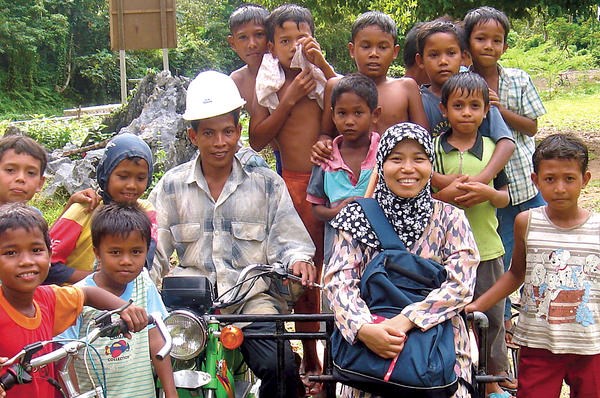 |
| Tri Mumpuni Iskandar (front row, second from r., with villagers in Aceh, Indonesia) developed microhydro projects that have already delivered electricity – and all that comes with it – to half a million Indonesians. She aims to get power to the 90 million who are still without it.
Courtesy of IBEKA |
Jakarta, Indonesia
It takes a lot of energy to keep up with Tri Mumpuni Iskandar, which seems fitting given her passion: to electrify poor, rural communities across Indonesia's sprawling 3,200-mile-long archipelago.
The charismatic director of the People Centered Business and Economic Institute (IBEKA), a nongovernmental organization that develops small hydropower projects, stays on the run.
Recently she visited a village in West Java on a Thursday; returned to Jakarta, the capital, on the weekend; and then embarked midweek for a 10-day tour of Europe and the United States.
Ms. Mumpuni, who goes by "Puni," says she loves to be out in the villages. But lately she spends much of her time traveling between places like San Francisco and New York, delivering lectures and drumming up donor support for her social enterprise.
On Aug. 31, Mumpuni was one of six recipients of the 2011 Ramon Magsaysay Award, which honors Asians committed to public service.
Others sing her praises, too. During a regional entrepreneurship summit in July, Indonesian Trade Minister Mari Pangestu recognized Mumpuni for her commitment to reducing poverty.
The petite entrepreneur hopes all the attention will help her bring electricity to the 90 million Indonesians without it.
"This technology can be very powerful," says Mumpuni, who calls microhydropower the trigger for community development. "If we make microhydro run properly, we generate electricity. If we generate electricity, we can generate other economic activities."
Villages can use the evening hours for studying or earning a living, such as making handicrafts, she says.
In the communities where IBEKA works, people now have access to radio, television, even the Internet.
"We can see the world now," says Yoyoyoyo Gasmana, a beneficiary of IBEKA's hydropower project in Cipta Gelar, southwest Java. "Ibu Puni has really helped us advance and develop by bringing technology to our traditional villages."
Most of IBEKA's 50 microhydro projects are built in rough terrain, such as high mountain passes or national forests far removed from roads and power lines. They each generate between 5 and 400 kilowatts of energy, enough to power up to 800 households. Collectively, they bring power to half a million people.
For Mumpuni, the most important aspect of IBEKA's work is promoting community ownership, connecting villagers to grants and loans, providing them with technical know-how, and helping them form a cooperative to manage their project.
In the nearly 20 years since Mumpuni's husband, Iskandar Budisaroso Kuntoadji, founded IBEKA, the couple has worked tirelessly to electrify the most remote corners of Indonesia. The task has taken them high into the mountains and deep into the jungle. It has also jeopardized their safety.
In 2008 former combatants kidnapped them in the once-restive province of Aceh. Mumpuni says she and her husband, who focuses on the technical and engineering aspects of the projects, hoped the former separatist soldiers would transform their weapons-building skills into making power-generating turbines.
"But actually, they wanted quick money," she says, "and the best way to do that was to take people for ransom." Mumpuni's release came after 15 hours in captivity, but it did little to shake her convictions. "We're committed to work for the poor, and this is one of the challenges," she says.
Dressed in sneakers and jeans, Mumpuni frequently visits project sites to see what it's like to live without electricity, an experience she finds disorienting and filled with limitations.
IBEKA also provides scholarships to schoolchildren and seed capital for villagers wanting to start small businesses.
While expressing disgust for socialites who spend $1,000 on Prada handbags, Mumpuni says she's hoping to get 1,000 of them to each donate that amount to her social enterprise. (Her brash, outspoken talk is rare in polite Indonesian society.)
Mumpuni has also successfully lobbied for policy changes that allow independent microhydropower plants to sell electricity to the government-run national grid. She's pushing the company to devote half of its profits to community development.
"Her contribution is so huge," says Pradygaha Kumayan Jati, a mechanical engineer and part of the development team for a project in Cianjur, a two-hour drive southeast of Jakarta. "She knows how to motivate the rural villagers and the strategy to make [a project] sustainable."
The daughter of an economist and a social worker, Mumpuni spent a contented childhood in Central Java. After attending university she received a scholarship from the Rockefeller Foundation to study energy and sustainable development.
She hopes to tell more stories in the future about the simple pleasures brought by electricity. "I saw people who once lived in darkness," she says. "They just want light in their lives. Can you imagine?"
Page created on 3/14/2012 12:00:00 AM
Last edited 1/5/2017 8:47:03 PM
